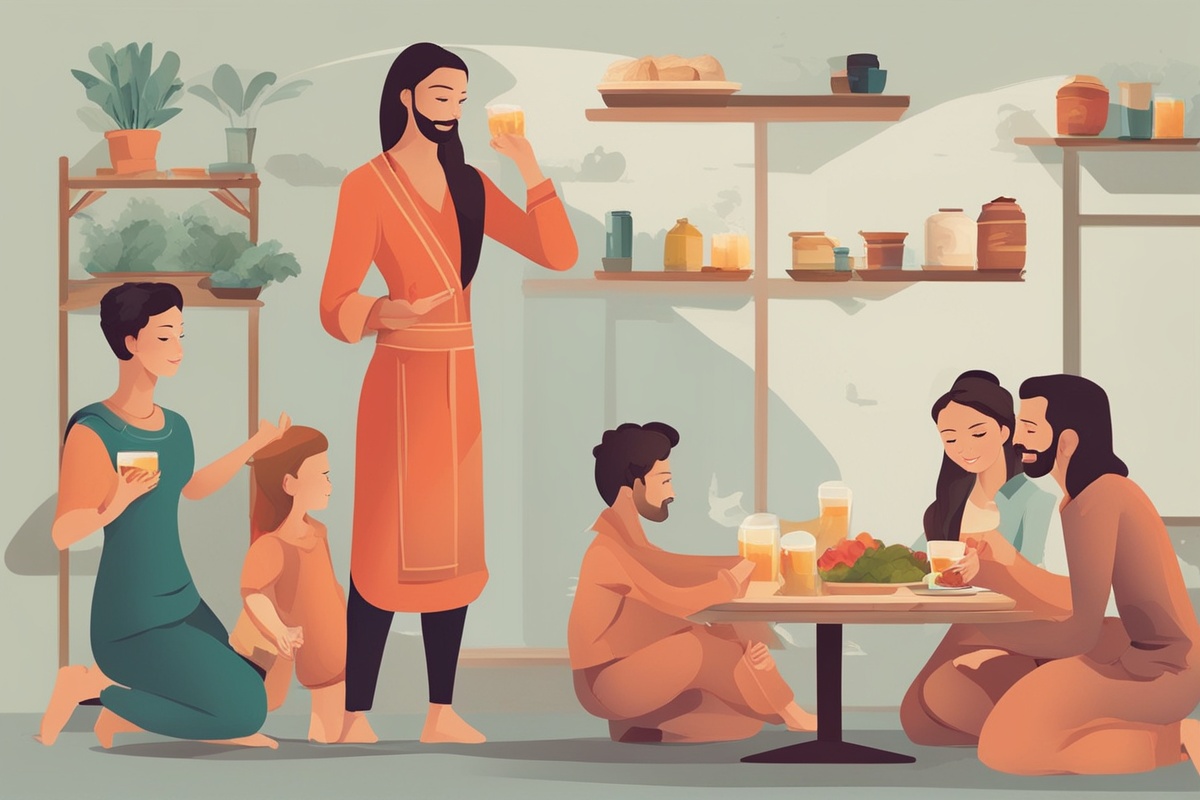Welcome to the world of health fasting, where discipline meets transformation, and a supportive community can make all the difference. If you’ve ever considered fasting for wellness—whether it’s intermittent fasting, extended water fasting, or another method—you’ve likely faced challenges like hunger pangs, social pressures, or just plain doubt. That’s where a fasting community comes in. Think of it as your personal cheer squad, a group of like-minded individuals who understand the ups and downs of fasting for health and are there to help you succeed. In this post, we’ll dive deep into why joining a fasting-focused group can supercharge your journey, how it impacts your physical and mental well-being, and practical ways to find or build your own network. Let’s explore how community support can turn health fasting from a solo struggle into a shared triumph.
What Is a Fasting Community and Why Does It Matter for Health Fasting?
A fasting community is essentially a group of people united by a common interest in fasting for health benefits. These groups can exist online—think forums, social media groups, or apps—or in person through local meetups or wellness clubs. The core idea is simple: shared experiences create accountability and motivation. When it comes to health fasting, which often involves restricting food intake for specific periods to improve metabolic health or lose weight, having others to lean on can be a game-changer. Studies show that social support significantly boosts adherence to lifestyle changes, including dietary practices like fasting (Cohen, 2004). Imagine trying to skip breakfast during a 16:8 intermittent fasting plan while your family chows down on pancakes. A community can offer tips, recipes, or just a virtual pat on the back to keep you going.
Beyond motivation, a fasting community provides a space to exchange knowledge. Newcomers learn from veterans about managing side effects like fatigue or headaches, while seasoned fasters might discover cutting-edge research or new protocols. It’s a two-way street of learning and encouragement that makes health fasting feel less isolating and more achievable.
The Science Behind Health Fasting and Community Support
Health fasting isn’t just a trend; it’s backed by a growing body of research. Intermittent fasting, for instance, has been linked to improved insulin sensitivity, reduced inflammation, and even longevity in animal studies (Mattson et al., 2017). Extended fasting can trigger autophagy, a cellular cleanup process that may protect against disease (Bagherniya et al., 2018). But here’s the catch: sticking to a fasting regimen is tough. Psychological barriers like stress or lack of willpower often derail even the most determined individuals. This is where community support intersects with science.
Research highlights that social connections can lower stress hormones like cortisol, which often spike during fasting due to hunger or lifestyle adjustments (Uchino, 2006). A supportive fasting community can act as a buffer, reducing anxiety and making the process feel less daunting. Moreover, group dynamics can foster a sense of accountability—when you’ve committed to a fasting challenge with others, you’re less likely to give up. It’s not just about willpower; it’s about wiring your environment for success through human connection.
Benefits of Joining a Fasting Community for Your Wellness Journey
Joining a fasting community offers tangible perks that go beyond just staying on track with your health fasting goals. Let’s break down some of the key advantages that can transform your experience:
- Emotional Support: Fasting can be mentally taxing, especially in the early days. A community provides a safe space to vent frustrations or celebrate small wins, like completing your first 24-hour fast.
- Practical Advice: From breaking a fast without digestive upset to managing cravings, community members often share real-world tips you won’t find in textbooks.
- Accountability: Checking in with a group—whether it’s a daily log or a weekly meetup—keeps you committed to your fasting for health goals.
- Diverse Perspectives: You’ll encounter people with different fasting styles (like 5:2 or OMAD—one meal a day) and health conditions, broadening your understanding of what works.
These benefits aren’t just anecdotal. Social support has been shown to improve outcomes in health interventions, including dietary changes, by enhancing self-efficacy—the belief in your ability to succeed (Bandura, 1997). When you’re surrounded by others on a similar health fasting path, that belief grows stronger.
How to Find or Build Your Own Fasting Community
Ready to connect with others who are passionate about fasting for health? You don’t have to look far—there are plenty of ways to find or even create a supportive network. Whether you’re a tech-savvy faster or prefer face-to-face interaction, here are some actionable steps to get started:
- Join Online Platforms: Websites like Reddit (check out r/intermittentfasting) or apps like Zero Fasting have vibrant communities where you can ask questions and share progress.
- Explore Social Media Groups: Look for Facebook groups or Instagram accounts focused on health fasting—many host challenges or live Q&A sessions with experts.
- Attend Local Events: Search for wellness workshops or fasting retreats in your area through platforms like Meetup.com to meet others in person.
- Start Your Own Group: If you can’t find a community that fits, create one! Invite friends or coworkers to try a fasting challenge together and use a group chat to stay connected.
- Engage with Health Professionals: Some dietitians or clinics offer group fasting programs—check with local health centers for guided support.
Finding the right fasting community might take some trial and error. Look for groups that align with your goals, whether it’s weight loss, metabolic health, or spiritual growth through fasting. The key is to engage actively—don’t just lurk! Share your story, ask for advice, and offer encouragement to others. That’s how real connections form.
Challenges of Fasting Communities and How to Overcome Them
While fasting communities are incredibly helpful, they’re not without pitfalls. One common issue is the spread of misinformation. Not every piece of advice you read online is backed by science—some members might push extreme fasting protocols that aren’t safe for everyone. To navigate this, always cross-check recommendations with credible sources like the Mayo Clinic or peer-reviewed studies (Harvard Health, 2020). If something sounds too good to be true, like a “miracle 7-day cleanse,” it probably is.
Another challenge is comparison. Seeing others post about their 72-hour fasts or dramatic weight loss can make you feel inadequate if you’re just starting with a 12-hour eating window. Remember, health fasting is personal—your body, lifestyle, and goals are unique. Focus on your progress, not someone else’s highlight reel. Lastly, some communities might feel cliquey or overly competitive. If a group doesn’t vibe with you, don’t hesitate to seek out another. The right fasting community should feel welcoming and supportive, not judgmental.
Maximizing Your Health Fasting Results with Community Support
A fasting community isn’t just a nice-to-have; it can be a powerful tool to amplify your results. Start by setting clear goals with your group—maybe it’s completing a 30-day intermittent fasting challenge or mastering a weekly 24-hour fast. Share updates regularly to stay accountable. Many successful fasters find that public commitment, even in a small group, drives consistency. You can also leverage the collective wisdom of the community to troubleshoot issues. Struggling with energy dips? Ask for hydration tips or electrolyte hacks. Feeling isolated at social events? Someone’s likely been there and can suggest how to handle “food pushers” without caving.
Finally, celebrate together. Did you hit a fasting milestone or notice better mental clarity? Share it with your community. Positive reinforcement from others can boost your motivation and reinforce the benefits of fasting for health. After all, wellness is a journey best traveled with friends—even if they’re virtual ones.
As we’ve seen, a fasting community can be the secret sauce to making health fasting not just sustainable but enjoyable. From emotional support to practical know-how, these groups provide the tools and encouragement needed to navigate the challenges of fasting for health. Whether you’re a beginner dipping your toes into intermittent fasting or a seasoned pro tackling extended fasts, having a network of like-minded individuals can transform your experience. So, take the leap—join a group, start a conversation, or build your own circle. Health fasting isn’t about going it alone; it’s about growing stronger together. What’s your next step? Drop a comment or reach out to a fasting buddy today, and let’s make wellness a shared mission.
References
- Bagherniya, M., Butler, A. E., Barreto, G. E., & Sahebkar, A. (2018). The effect of fasting or calorie restriction on autophagy induction: A review of the literature. Ageing Research Reviews, 47, 183-197.
- Bandura, A. (1997). Self-efficacy: The exercise of control. New York: Freeman.
- Cohen, S. (2004). Social relationships and health. American Psychologist, 59(8), 676-684.
- Harvard Health Publishing. (2020). Intermittent fasting: The science behind the trend. Retrieved from Harvard Medical School website.
- Mattson, M. P., Longo, V. D., & Harvie, M. (2017). Impact of intermittent fasting on health and disease processes. Ageing Research Reviews, 39, 46-58.
- Uchino, B. N. (2006). Social support and health: A review of physiological processes potentially underlying links to disease outcomes. Journal of Behavioral Medicine, 29(4), 377-387.






